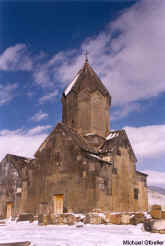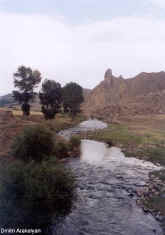|

|
Continuing, the road
reaches Vernashen,
(historical name Srkoghovk, known till 1946 as Bashkend) site of the
Masis shoe factory. Inhabitants came from Salmast in 1829. In village, S. Hakob
church of 17th c. built with
earlier carved blocks, has been converted
into a museum
for the Gladzor university.
There
are photographs
|
|
Some 150 meters E past the
main turnoff into downtown
Yeghegnazdor, a
paved road goes S toward Agarakadzor,
just across the Arpa. Immediately after crossing the bridge, turn right and follow the
dirt road downstream about 2 km to the
well- preserved 13th
c. bridge which served
once
the road to Julfa.
There is a 13- 15th c.
graveyard
2km E of town.
On
|

|
|
and maps charting the existence of
educational institutions in Armenia, and the influence of Gladzor and
its pupils. Outside the door are seven modern khachkars representing the
trivium and qvadrivium, the 7 branches of medieval learning. Tanahati Vank (or
Tanade), the actual site of the university is 7
km SE continuing along the same narrow paved road.
About
3 km E of Tanahati Vank is Arkazi
S. Khach (Holly Cross) Vank,
a church completely rebuilt in 1870-71, still a significant piligrimage
site particularly on October 8 or 11. According to legend, a piece of the true Cross, given by the
Byzantine Emperor Heraclius to the wife of Burtegh, ruler of
Syunik, was
buried in the walls. Boloraberd
or Proshaberd fortress, is 6-7 km N of Vernashen on a poor jeep track (left just
beyond Gladzor U. Museum). The
fortress was built in 13th c. by Prince Prosh, namesake of
the Proshian family; shrine to E. About
one km distant is the Spitakavor
S. Astvatsatsin church, built in 1321 by the Proshians.
|
|
the N
bank of the Arpa somewhere nearby is the
abandoned site
of Erdes with a ruined medieval castle and a small church. |